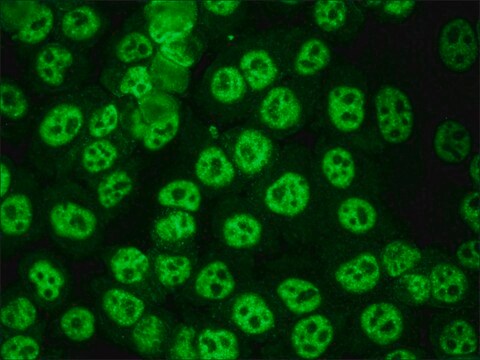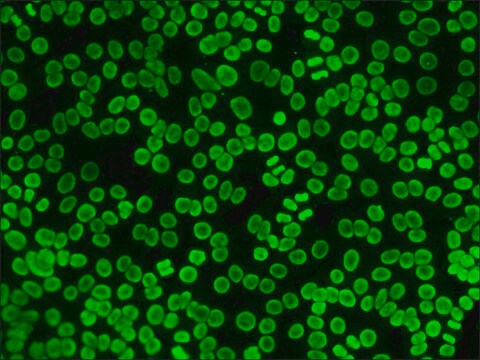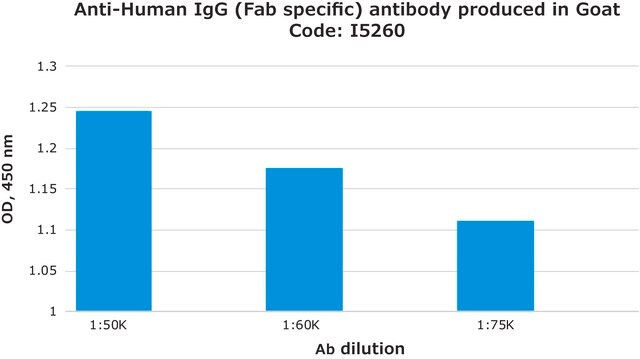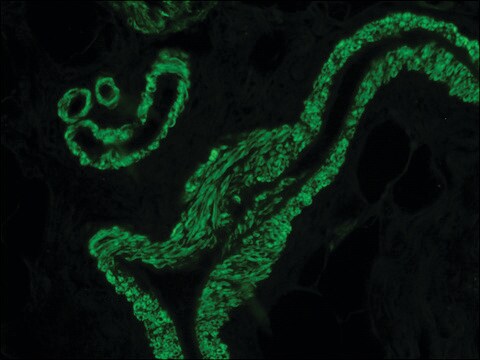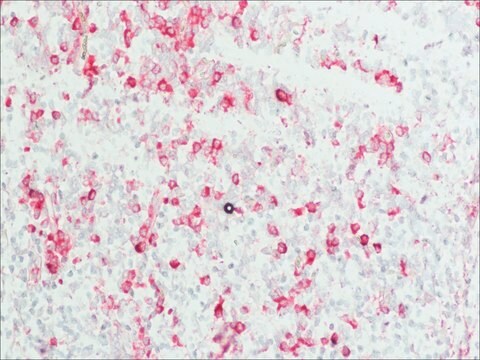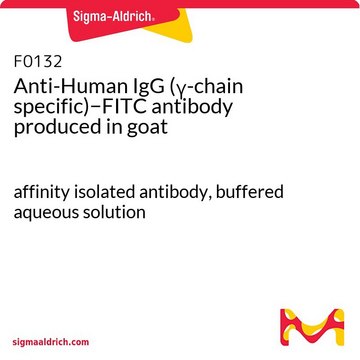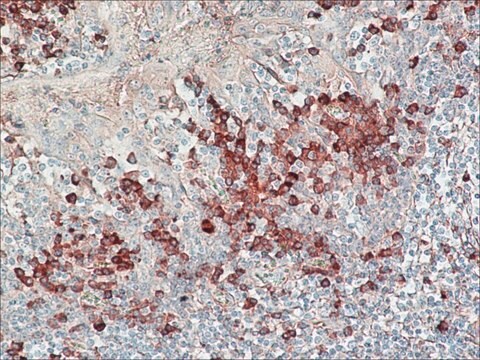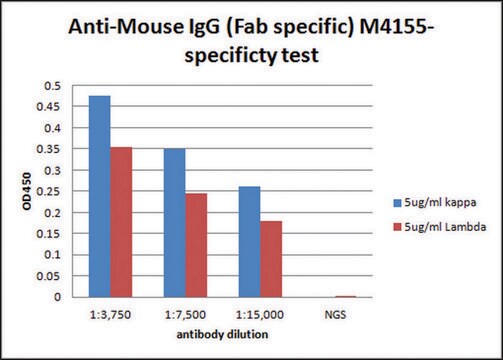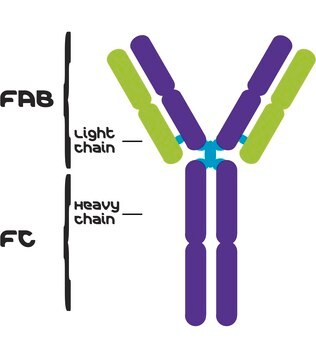F5512
Anti-Human IgG (Fab specific)−FITC antibody produced in goat
affinity isolated antibody, buffered aqueous solution
Synonym(s):
Goat Anti-Human IgG (Fab specific)−Fluorescein isothiocyanate
Sign Into View Organizational & Contract Pricing
All Photos(1)
About This Item
Recommended Products
biological source
goat
Quality Level
conjugate
FITC conjugate
antibody form
affinity isolated antibody
antibody product type
secondary antibodies
clone
polyclonal
form
buffered aqueous solution
storage condition
protect from light
technique(s)
immunofluorescence: 1:16-1:32 using Hep2 cells
storage temp.
−20°C
target post-translational modification
unmodified
Related Categories
General description
Immunoglobulin G (IgG) belongs to the immunoglobulin family and is a widely expressed serum antibody. An immunoglobulin has two heavy chains and two light chains connected by a disulfide bond. It is a glycoprotein and mainly helps in immune defense. IgG is usually found as a monomer. IgG is further subdivided into four classes namely, IgG1, IgG2, IgG3, and IgG4. About 70 percent of the total immunoglobulin consists of IgG. Immunoglobulin G (IgG) participates in hypersensitivity type II and type III.
The product binds all human Igs and provides reduced background with mouse or rat samples.
Application
Anti-Human IgG (Fab specific)-FITC antibody has been used:
- in fluorescent staining
- in dual color fluorescent labeling
- in fluorescence-activated cell sorting (FACS) analysis
Anti-Human IgG (Fab specific)-FITC antibody produced in goat may be used at a working antibody dilution of 1:16 - 1:32 for anti-nuclear antibody (A.N.A.) assay on acetone-fixed human Hep2 cells. This antibody was used in FACS of HNE2 and KNE2/LMP1 cells. It was also used to perform TARDIS assay for detection of topoisomerases I and II that are covalently bound to DNA in K562 leukemia cells.
Biochem/physiol Actions
IgG antibody subtype is the most abundant of serum immunoglobulins of the immune system. It is secreted by B cells and is found in blood and extracellular fluids and provides protection from infections caused by bacteria, fungi and viruses. Maternal IgG is transferred to fetus through the placenta that is vital for immune defense of the neonate against infections. The coupling of FITC to Anti- Human IgG (Fab specific) antibody allows for the visualization of protein by fluorescent microscopy.
Other Notes
No cross-reaction with mouse and rat IgG.
Physical form
Solution in 0.01 M phosphate buffered saline, pH 7.4, containing 15 mM sodium azide.
Disclaimer
Unless otherwise stated in our catalog or other company documentation accompanying the product(s), our products are intended for research use only and are not to be used for any other purpose, which includes but is not limited to, unauthorized commercial uses, in vitro diagnostic uses, ex vivo or in vivo therapeutic uses or any type of consumption or application to humans or animals.
Not finding the right product?
Try our Product Selector Tool.
Storage Class Code
10 - Combustible liquids
WGK
nwg
Personal Protective Equipment
dust mask type N95 (US), Eyeshields, Gloves
Choose from one of the most recent versions:
Already Own This Product?
Find documentation for the products that you have recently purchased in the Document Library.
Customers Also Viewed
A human Fab exclusively binding to the extracellular domain of LMP2A
Cao Q, et al.
Biochemical and biophysical research communications, 482(2), 226-231 (2017)
Molecular imaging application of radioiodinated anti-EGFR human Fab to EGFR-overexpressing tumor xenografts
Xu N, et al.
Anticancer research, 29(10), 4005-4011 (2009)
Xin Wang et al.
Cancer biology & therapy, 6(6), 980-987 (2007-05-31)
The aims of this study were to generate a human Fab fragment against EGFR; conjugate it to paclitaxel (Taxol) as an immuno-chemotherapy agent; and investigate its in vitro anti-tumor efficacy on A431 epidermoid carcinoma cells. A431 cells (EGFR-positive), NIH 3T3
Molecular Genetics of Immunoglobulin (1987)
Miguel López-Lázaro et al.
Mutagenesis, 26(4), 489-498 (2011-03-09)
Green tea and its major active constituent, (-)-epigallocatechin-3-gallate (EGCG), are in clinical trials for the prevention and treatment of several diseases such as cancer. DNA topoisomerase (topo) poisons are commonly prescribed anticancer drugs that kill cancer cells by inducing topo-DNA
Our team of scientists has experience in all areas of research including Life Science, Material Science, Chemical Synthesis, Chromatography, Analytical and many others.
Contact Technical Service
